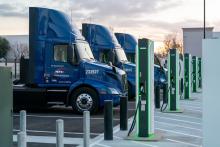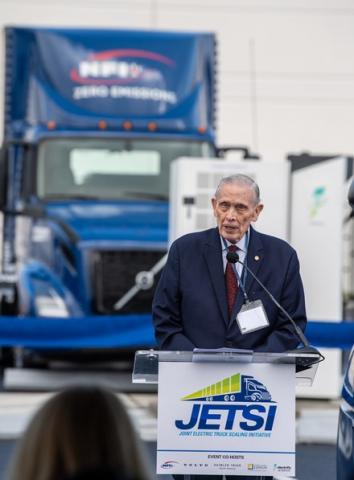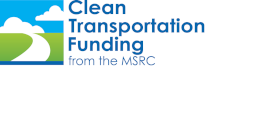
On February 27, MSRC Chair Larry McCallon joined all the Joint Electric Truck Scaling Initiative (JETSI) project partners to celebrate the ribbon cutting for NFI Industries’ new battery-electric truck fleet and charging depot in Ontario. The MSRC contributed $3 million in Clean Transportation Funding to help NFI offset the cost of 50 Class 8 zero-emission trucks – including 30 Freightliner e-Cascadia trucks and 20 Volvo VNR Electric trucks.
The JETSI is a regional collaborative of public and private organizations committed to deploy 100 regional haul and drayage battery-electric trucks in Southern California to demonstrate strategies to advance the market for these vehicles. Other funding partners include the California Air Resources Board (CARB), the California Energy Commission (CEC), the South Coast Air Quality Management District (South Coast AQMD), the Port of Long Beach, and Southern California Edison (SCE).
To fuel its new battery-electric truck fleet, NFI worked with SCE and Electrify America to install 38 individual DC fast chargers at its warehouse facility, capable of refueling speeds up to 350 kW for certain trucks, featuring approximately 7 MW of DC charging capacity when the facility is fully operational. Each truck typically drives two port pickups per day, running from Ontario to the Ports of Los Angeles and Long Beach, for an average of 220 miles driven between each recharge.
These 50 new zero-emission trucks will offset about 4,400 metric tons of greenhouse gas emissions yearly, resulting in 2.45 tons of weighted criteria pollutant emission reductions and displacing more than 2.75 million gallons of diesel throughout the five-year project.

In his remarks, Chair McCallon (see photo) reflected on the importance of this project in promoting advanced clean heavy-duty technologies. “With these investments, NFI is making one of the earliest, large-scale deployments of zero-emission technology in Southern California. The MSRC will continue our support of this project by providing opportunities for NFI and other organizations in the South Coast air basin to secure funding to help offset the incremental cost of these clean air projects.”
CARB Chair Liane Randolph said she was there to celebrate the power of partnership. “We are fortunate to have the resources like the Cap-and-Trade funds to support this innovation, but without companies like NFI stepping up and saying they want to give this a try, without Daimler and Volvo developing the vehicles, and without utilities like Southern California Edison, Electrify America and other infrastructure partners, this doesn’t happen. All of this comes together to build the future.”
Commissioner Patty Monahan of the CEC said she’s been to a fair amount of ribbon cuttings for medium- and heavy-duty infrastructure but this was the greatest number of chargers she had ever seen in one site. “We get really excited seeing these technologies deployed. They open this door to the future and you’re showing what the future looks like – this is the future of transportation.”
South Coast AQMD Vice Chair Michael Cacciotti also acknowledged the importance of all the project partners. “These are great visionary partners with CARB, Energy Commission, public/private partners, and Larry on the AQMD and MSRC,” he said. “Mobile sources start at the ports with ocean-going vessels, the locomotives that traverse our neighborhoods, and heavy-duty trucks – the biggest source of air pollution in our basin. As these trucks traverse our neighborhoods to warehouses and grocery stores, nitrous oxides, carbon monoxide, and diesel particulate matter are going into our neighborhoods affecting the kids, the youth, the families – so the fact that there are electric trucks traveling on our freeways and in our neighborhoods will help protect hundreds of thousands of kids that have asthma and other respiratory diseases. So, let’s continue the journey.”
Last summer, MSRC Vice Chair Brian Berkson was on-hand to celebrate the deployment of the first 50 electric trucks for the JETSI project at Schneider’s electric truck charging depot in El Monte, which the MSRC also helped co-fund.
